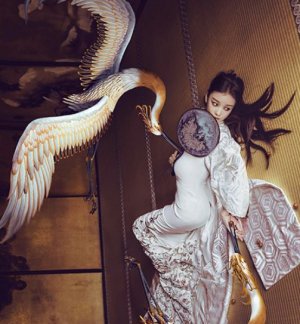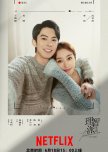Deze recentie kan spoilers bevatten
Enjoyable and light drama, yet too dominant office plot and near too perfect main characters
I came across this drama on Netflix and found it quite enjoyable to watch. Yet, it didn’t fully convince me or intrigue me with anything unparalleled, it was a rather smooth storyline so you could already expect where things will lead to.
Aspects which I liked:
For people who just started their career or are within the midst of it, there will be something in the drama you can relate to. Whether it’s obstacles in women’s careers, financial independency, pursuing a stable job vs a career path with more uncertainty or not knowing what you want in life, you can find all those topics in the drama. The main messages are also linked to this, as in Ziyan’s story: she got lost and forgot about what she truly wants but eventually gets back her self-esteem and path in life (“At our age, we should understand that not everyone can see the view at the top. What if we’re the ship that ran aground? Then we just rest until the next wave comes.”) Or Su Yang who believes you can only be happy and live life when you’re established, but then realizes that having the support of people you can trust actually makes you stronger and helps you to believe in yourself. Of course, there’s also the “pride from the achievements of your own honest hard work and growth” aspect. In the end, Ruoxin earns her spot at the top without playing dirty tactics and not ridiculing those losing their power. In addition, though related to societal norms, I liked the way the mothers analyze how they raised their children and what matters to them as mothers. The friendship between the mothers was a nice side benefit. And overall, I liked that the relationships between the main characters were supportive and sincere, everyone was pulling in the same direction. Also, all the couples were very likable.
Aspects I didn’t like:
I think the central character, Ruoxin, is lacking a bit human touch. Of course, she has some setbacks, but they are mainly related to bad luck, stress and office politics than something that can be traced back to her. Other than that, she always does a fantastic job, always has a diplomatic and sharp answer at hand, gives precise commands in a blink, and always has a solution to tackle things efficiently. I cannot count how many times she was praised as capable and outstanding in the series. Why does a strong female character need to be presented like an iron lady? I cannot help but compare her to the female lead in “Find yourself”, which I found way more believable. I think it’s only natural that you doubt yourself sometimes and that you don’t always know what’s right (at least from my understanding, perfectionist people doubt themselves the most). There will also be days when you can’t work that productively, a task you’re not good at, or a situation that renders you dumbfounded. In the end, Ruoxin learns how to open up a little, but other than that, she remains stiff, not only in terms of personality but also in her body language. And it’s not only her, Xu Minjie, Lisa and Qi Xiao are equally near too perfect characters. I get that Qi Xiao is determined, hard-working and reliable. But isn’t he like the perfect boyfriend – smart, handsome, always caring, always doing his utmost and succeeding in it, and always understanding how other people feel? He’s even that good at cooking and diversified in his recipes that he can make dishes reminding Ruoxin of her childhood. Well, it’s a drama series after all.
Another aspect I didn’t like was that the office plot was too dominant. I get that the main stage of the series is the office and that it’s about a career-driven woman. But watching the trailer didn’t give me the impression that it’s a series about office work on electric cars. I almost felt like I was working there. And is it really necessary to constantly work overtime and be available 24/7 for your boss to deserve to be called capable and hard-working? Apart from eating out and Ruoxin’s fascination about astronomy, what else have we learned about the private life of the main characters? I think that “Find yourself” was more multi-dimensional in this aspect and outlines the societal linkages of the characters in a more holistic way. And while the characters in “Find yourself” were going through understandable struggles of a relationship with an age gap (family, colleagues, neighbors etc), in “The Rational Life” you’re left with a happily ever after and never get to the point where they need to work on their relationship (it only gives a glimpse when Qi Xiao prepares for the design contest). Moreover, the kissing scenes in “The Rational Life” felt unnatural – a little bit more passion wouldn’t have hurt the drama. And finally, something which I normally wouldn’t bother to point out, but I found it funny that they were emphasizing so much the environmental aspect of their electric cars, while neglecting that the product life cycle of electric cars isn’t 100% clean (and it depends on the energy source) plus they were always carrying around plastic bags and take away in plastic packaging.
All in all, the series is sweet and enjoyable, maybe it even motivates you to work harder for your career since it was almost like an advertisement for hard work, but other than that, there’s not more to it.
Aspects which I liked:
For people who just started their career or are within the midst of it, there will be something in the drama you can relate to. Whether it’s obstacles in women’s careers, financial independency, pursuing a stable job vs a career path with more uncertainty or not knowing what you want in life, you can find all those topics in the drama. The main messages are also linked to this, as in Ziyan’s story: she got lost and forgot about what she truly wants but eventually gets back her self-esteem and path in life (“At our age, we should understand that not everyone can see the view at the top. What if we’re the ship that ran aground? Then we just rest until the next wave comes.”) Or Su Yang who believes you can only be happy and live life when you’re established, but then realizes that having the support of people you can trust actually makes you stronger and helps you to believe in yourself. Of course, there’s also the “pride from the achievements of your own honest hard work and growth” aspect. In the end, Ruoxin earns her spot at the top without playing dirty tactics and not ridiculing those losing their power. In addition, though related to societal norms, I liked the way the mothers analyze how they raised their children and what matters to them as mothers. The friendship between the mothers was a nice side benefit. And overall, I liked that the relationships between the main characters were supportive and sincere, everyone was pulling in the same direction. Also, all the couples were very likable.
Aspects I didn’t like:
I think the central character, Ruoxin, is lacking a bit human touch. Of course, she has some setbacks, but they are mainly related to bad luck, stress and office politics than something that can be traced back to her. Other than that, she always does a fantastic job, always has a diplomatic and sharp answer at hand, gives precise commands in a blink, and always has a solution to tackle things efficiently. I cannot count how many times she was praised as capable and outstanding in the series. Why does a strong female character need to be presented like an iron lady? I cannot help but compare her to the female lead in “Find yourself”, which I found way more believable. I think it’s only natural that you doubt yourself sometimes and that you don’t always know what’s right (at least from my understanding, perfectionist people doubt themselves the most). There will also be days when you can’t work that productively, a task you’re not good at, or a situation that renders you dumbfounded. In the end, Ruoxin learns how to open up a little, but other than that, she remains stiff, not only in terms of personality but also in her body language. And it’s not only her, Xu Minjie, Lisa and Qi Xiao are equally near too perfect characters. I get that Qi Xiao is determined, hard-working and reliable. But isn’t he like the perfect boyfriend – smart, handsome, always caring, always doing his utmost and succeeding in it, and always understanding how other people feel? He’s even that good at cooking and diversified in his recipes that he can make dishes reminding Ruoxin of her childhood. Well, it’s a drama series after all.
Another aspect I didn’t like was that the office plot was too dominant. I get that the main stage of the series is the office and that it’s about a career-driven woman. But watching the trailer didn’t give me the impression that it’s a series about office work on electric cars. I almost felt like I was working there. And is it really necessary to constantly work overtime and be available 24/7 for your boss to deserve to be called capable and hard-working? Apart from eating out and Ruoxin’s fascination about astronomy, what else have we learned about the private life of the main characters? I think that “Find yourself” was more multi-dimensional in this aspect and outlines the societal linkages of the characters in a more holistic way. And while the characters in “Find yourself” were going through understandable struggles of a relationship with an age gap (family, colleagues, neighbors etc), in “The Rational Life” you’re left with a happily ever after and never get to the point where they need to work on their relationship (it only gives a glimpse when Qi Xiao prepares for the design contest). Moreover, the kissing scenes in “The Rational Life” felt unnatural – a little bit more passion wouldn’t have hurt the drama. And finally, something which I normally wouldn’t bother to point out, but I found it funny that they were emphasizing so much the environmental aspect of their electric cars, while neglecting that the product life cycle of electric cars isn’t 100% clean (and it depends on the energy source) plus they were always carrying around plastic bags and take away in plastic packaging.
All in all, the series is sweet and enjoyable, maybe it even motivates you to work harder for your career since it was almost like an advertisement for hard work, but other than that, there’s not more to it.
Vond je deze recentie nuttig?










